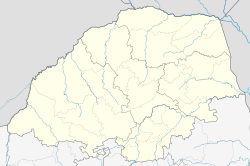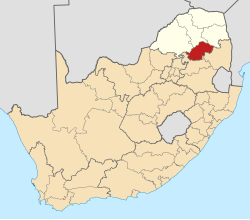Mecklenburg | |
|---|---|
| Coordinates: 24°23′38″S30°04′26″E / 24.394°S 30.074°E | |
| Country | South Africa |
| Province | Limpopo |
| District | Sekhukhune |
| Municipality | Fetakgomo Tubatse |
| Area | |
• Total | 5.94 km2 (2.29 sq mi) |
| Population (2001) [1] | |
• Total | 1,611 |
| • Density | 271/km2 (702/sq mi) |
| Time zone | UTC+2 (SAST) |
| Area code | 045 |
Mecklenburg is a town in Fetakgomo Tubatse Local Municipality in the Limpopo province of South Africa ruled by the Magadimane Ntweng Chiefancy.


